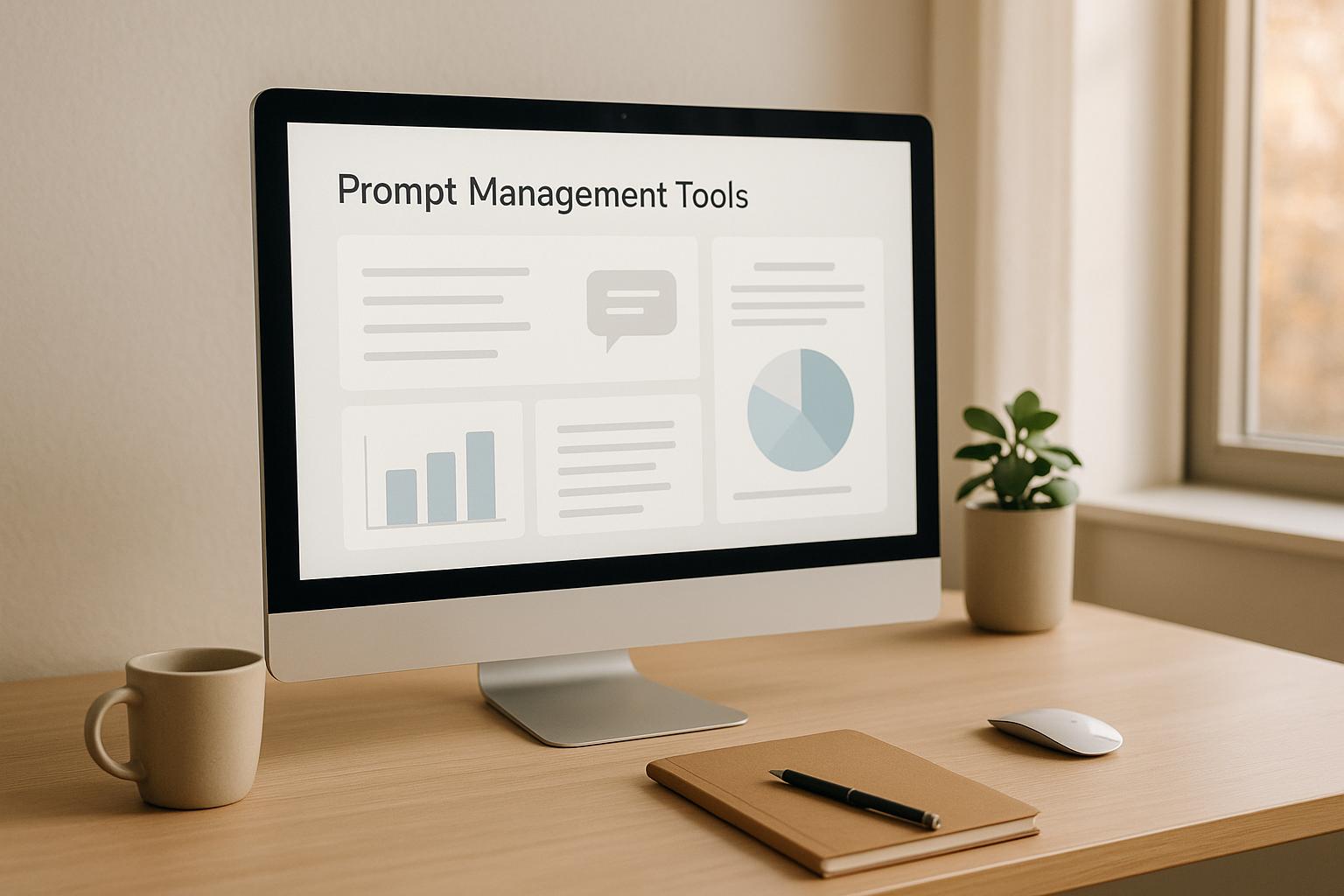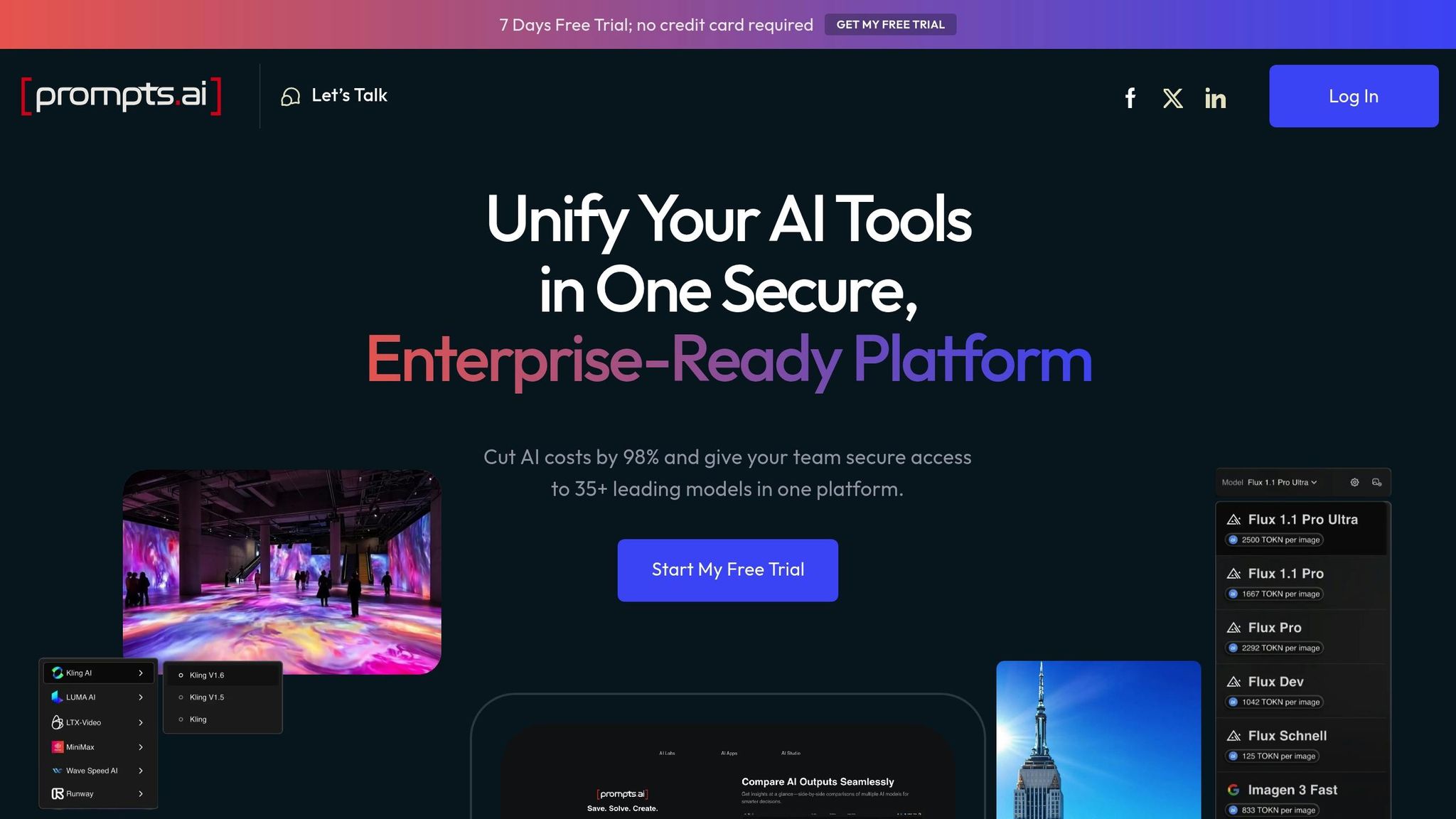
In today’s AI-driven workplace, managing prompts effectively is critical for achieving consistent, efficient, and scalable results. Without proper systems, teams risk disorganized workflows, compliance issues, and wasted resources. Tools like Prompts.ai centralize prompt management, offering features like version tracking, analytics, and cost control, while supporting over 35 language models such as GPT-4 and Claude. These solutions can reduce iteration cycles by 40%, boost team efficiency by 35%, and simplify workflows by 50%.
Prompts.ai stands out with real-time cost tracking, role-based permissions, and multi-model integration, making it a strong choice for enterprises. Smaller teams may find simpler tools sufficient but risk scalability challenges as operations grow. Choosing the right platform depends on your organization’s size, needs, and goals.

Prompts.ai is a platform designed for enterprise AI orchestration, bringing together over 35 leading language models - such as GPT-4, Claude, LLaMA, and Gemini - into one secure and unified system. It simplifies multi-model management, giving teams the tools they need to handle prompts with ease and confidence.
The platform uses a hierarchical folder system, allowing teams to organize prompts by project or use case. For instance, marketing teams can group prompts by campaign, while developers might sort them by model version. This structure, combined with keyword filtering, model type categorization, and workflow stage sorting, ensures quick access to the right prompts.
With role-based access controls, organizations can assign roles like admin, editor, or viewer to users. This ensures that sensitive data is only accessible to authorized personnel - an essential feature for companies in regulated industries.
Prompts.ai also includes built-in analytics to monitor prompt usage, assess response quality, and evaluate model consistency. Features like A/B testing and historical trend analysis help teams refine their workflows over time. Detailed changelogs record every edit, action, and timestamp, making it easy to revert changes, compare versions side-by-side, and maintain compliance documentation.
Cost management tools provide real-time and historical insights into API usage and spending, whether at the prompt, project, or team level. Organizations can set usage limits, allocate budgets, and manage costs effectively with the pay-as-you-go TOKN system, which ties expenses directly to usage.
Security is a top priority. Prompts.ai incorporates enterprise-grade encryption, detailed audit logs, single sign-on (SSO), and multi-factor authentication (MFA), ensuring compliance with SOC 2 and GDPR standards while keeping data secure both in transit and at rest.
For example, a financial services firm uses Prompts.ai to centralize support prompts by product and compliance status. This setup makes it easier to update prompts during regulatory changes, while analytics help improve customer satisfaction and control costs.
Shared libraries further enhance collaboration by allowing teams to clone, adapt, and version prompts across departments. The platform’s interface is fully localized for U.S. users, displaying prices in dollars ($), using the MM/DD/YYYY date format, and adhering to U.S. English conventions. This ensures a smooth and intuitive experience for both technical and non-technical teams.
Prompt management platforms take varied approaches to streamline, monitor, and improve AI workflows. While they share the goal of enhancing efficiency with language models, their methods and features differ, offering unique solutions to common challenges.
A cornerstone of these systems is Organization and Version Control. Platforms typically provide centralized repositories to store prompts, along with metadata like model settings, temperature configurations, and usage context. Some systems offer user-friendly, visual interfaces requiring no coding skills, while others integrate with Git-like systems, using SHA hashes to track changes for more technical users.
Collaboration Features are another key aspect, enabling teams across marketing, product development, and engineering to work together on prompt creation and refinement. These platforms often include approval workflows and audit logs to ensure updates align with quality and regulatory standards.
To ensure prompts perform effectively, robust Performance Tracking and Analytics tools are essential. These features monitor metrics such as accuracy, latency, response time, and throughput. Advanced platforms even include real-time monitoring tools like hallucination detection and anomaly alerts, helping teams identify and address issues before they escalate. For example, some teams have reported achieving nearly 100% response accuracy while reducing manual evaluations and improving operational workflows.
Cost Management tools are equally important, especially given the variable costs associated with different models. For instance, GPT-3.5-Turbo costs around $0.002 per 1,000 tokens, whereas GPT-4 costs $0.12 per 1,000 tokens. Effective platforms analyze token usage, limit unnecessary API calls, and implement batch processing to keep costs under control.
| Feature Category | Common Capabilities | Key Benefits |
|---|---|---|
| Version Control | Visual interfaces, Git integration, SHA hashing | No-code tracking, developer-friendly options |
| Analytics | Usage stats, latency monitoring, cost tracking | Performance improvement, cost efficiency |
| Collaboration | Shared workspaces, approval workflows, audit logs | Streamlined teamwork, compliance support |
| AI Integration | Multi-model support, framework compatibility | Flexible deployment options |
Security and Compliance are critical for enterprise users, with platforms offering features like audit trails that log changes with timestamps and user attribution. Some also include automated PII redaction and ensure adherence to data security standards to meet regulatory requirements.
The success of these systems often hinges on how they are implemented. Studies show that even small wording changes in prompts can significantly impact AI outputs. Centralized prompt management helps teams avoid scattering prompts across codebases, making it easier to track and refine them systematically.
Integration Capabilities vary widely. Some platforms are designed for specific frameworks, while others adopt a provider-agnostic approach, allowing teams to work across multiple AI services. The choice depends on whether teams prioritize deep integration with existing tools or the flexibility to switch between language models and providers.
Cost-saving measures include analyzing prompt length, recommending cost-efficient models, and monitoring response sizes. Techniques like batch processing and caching can further reduce API expenses without sacrificing performance. Regular audits and prompt adjustments also help identify and eliminate inefficiencies over time.
Making informed decisions about AI infrastructure often involves weighing the pros and cons of various prompt management systems. Each platform type offers distinct benefits but also comes with certain limitations that can influence long-term success.
Prompts.ai stands out by offering a comprehensive suite of enterprise-grade features. It brings together 35+ language models in a unified ecosystem, eliminating the hassle of managing multiple vendors and enabling direct model comparisons. This streamlined approach simplifies operations and enhances decision-making.
One of Prompts.ai's standout features is its real-time cost monitoring, which goes beyond basic storage tools. Unlike platforms that only track usage after the fact, Prompts.ai provides live updates, helping teams stay within budget. Its pay-as-you-go TOKN credit system further aligns costs with actual usage, avoiding recurring subscription fees - an appealing option for organizations with fluctuating AI workloads.
Additionally, Prompts.ai includes enterprise-grade role controls and detailed audit trails, ensuring accountability and compliance for AI-related decisions. These features make it an ideal choice for larger organizations with complex governance requirements.
That said, its extensive feature set might feel overwhelming for smaller teams used to simpler tools. For organizations with basic prompt management needs, the platform's full range of enterprise capabilities may seem excessive at first. However, Prompts.ai offers hands-on onboarding and training programs to help ease this adjustment.
While Prompts.ai provides a well-rounded solution, other platforms cater to specific needs. For example, some systems excel in version control, visual collaboration, or simplicity, making them better suited for smaller projects where engineering teams manage most of the prompt-related tasks. However, these alternatives often encounter scalability issues. A platform that works well for a small team experimenting with a handful of prompts may struggle to meet the demands of enterprise-level operations involving thousands of prompts across diverse use cases.
Another key consideration is performance tracking. Advanced systems often monitor metrics like accuracy, latency, and throughput, while many simpler platforms only offer basic usage statistics. This lack of detailed insights can leave teams unprepared for emerging performance issues that could disrupt production systems.
Cost management capabilities also vary widely. Some platforms analyze token usage patterns and suggest cost-efficient models, while others simply pass along provider charges without offering optimization recommendations. Security and compliance features further differentiate platforms. Enterprise solutions often include automated PII redaction and detailed audit logs to meet stringent data security standards, whereas simpler systems may lack these safeguards, increasing compliance risks for organizations handling sensitive information.
Implementation complexity is another factor. Some platforms require significant technical setup and ongoing maintenance, while others offer plug-and-play solutions. The choice often depends on whether an organization values control and customization over simplicity and speed of deployment.
Finally, avoiding vendor lock-in is crucial. Provider-agnostic systems like Prompts.ai allow teams to switch between AI models without overhauling their prompt management infrastructure. In contrast, platforms tied to a single provider may offer deeper integration but risk creating dependencies if the provider changes pricing or availability.
| Platform Type | Organization | Permissions | Cost Tracking | Compliance | Multi-Model Support |
|---|---|---|---|---|---|
| Prompts.ai | Excellent | Enterprise-grade | Real-time FinOps | Full audit trails | Over 35 models unified |
| Version Control Systems | Good | Basic | Limited | Developer-focused | Requires custom integration |
| Collaboration Platforms | Good | Team-based | Basic | Limited | Often single-provider |
| Build-it-Yourself | Custom | Custom | Manual | Requires development | Depends on implementation |
Choosing the right prompt management system means finding a platform that matches your organization’s unique requirements. The options range from expansive enterprise solutions to specialized tools targeting specific tasks within prompt management.
Prompts.ai stands out by offering an all-in-one ecosystem that includes real-time cost tracking, a flexible pay-as-you-go TOKN credit system, and enterprise-level controls. It brings together the essential tools needed for streamlined and secure prompt management.
As highlighted earlier, features like performance tracking, smooth integration, and cost efficiency are fundamental to success in this space. These capabilities pave the way for critical considerations such as scalability, security, and team collaboration. Whether you’re handling large-scale prompt operations or just beginning your AI journey, focusing on these elements will ensure a strong foundation for your efforts.
Prompts.ai is committed to maintaining high standards of data security, adhering to SOC 2 and GDPR regulations to protect user information and uphold privacy. SOC 2 compliance ensures the platform meets essential trust principles, including security, availability, and confidentiality. This framework helps Prompts.ai build and maintain reliable systems capable of addressing ongoing challenges in AI governance.
To meet GDPR requirements, Prompts.ai employs practices like obtaining explicit consent, minimizing data collection, and ensuring transparency in how personal data is handled. These measures allow the platform to align with regulatory expectations while providing a secure and dependable environment for managing your prompts with ease.
Prompts.ai equips teams with tools to simplify and optimize prompt management, making workflows more streamlined. With features like structured organization, version control, and collaboration tools, teams can cut iteration cycles by up to 40% and see a 35% improvement in efficiency.
The platform also includes a built-in prompt review system that enhances quality, reduces errors, and promotes stronger teamwork. These features work together to speed up prompt refinement and make collaboration more seamless, driving productivity to new levels.
The pay-as-you-go TOKN system ensures you’re charged only for the tokens you use, making it a cost-effective option. This eliminates any upfront expenses, allowing businesses to adjust their usage as needed without financial strain.
With detailed insights into token consumption, the system provides tools to help manage costs effectively. By monitoring usage, caching commonly used prompts, and choosing models that best fit specific tasks, businesses can maintain high performance while keeping expenses under control.


